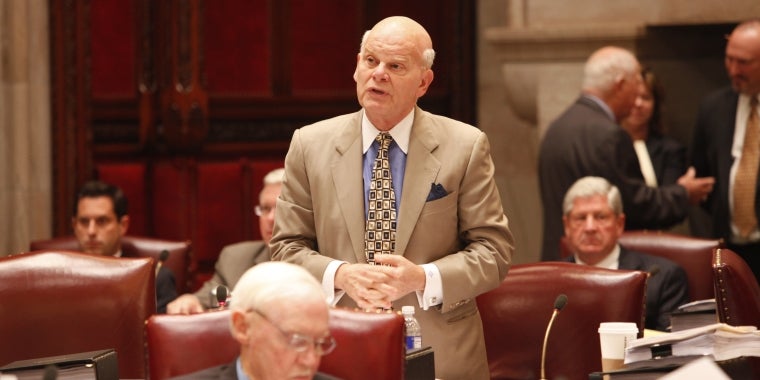
Senators Saland, Hannon, Little and O. Johnson Announce Legislative Package to Stop Bullying in NYS
Stephen M. Saland
May 4, 2010
-
ISSUE:
- Education
Recent news stories have highlighted a number of vicious incidents of bullying in New York schools that show this type of peer abuse has become more pervasive and destructive. Last month, a West Islip teen hanged herself after being harassed by cyber-bullies who taunted her even in death. Another West Islip teenager was repeatedly cyber-bullied and beaten so badly by a classmate that she had to have reconstructive surgery on her face. In Brooklyn, a 5-year-old kindergarten student was beat up by classmates, who also cut her hair.
Yesterday, the Governor of Massachusetts signed anti-bullying legislation into law in the wake of the suicide of 15-year-old Phoebe Prince of Massachusetts, which brought national attention to the problem of bullying and cyber-bullying.
·Require school districts to include methods for discouraging acts of bullying and cyber-bullying within the required instruction in civility, citizenship, and character education;
Define bullying and cyber-bullying and add these acts to the list of incidents for which disciplinary measures must be taken pursuant to the school district’s code of conduct;Require all school employees to report incidents of bullying and cyber-bulling;
·Establish a state hotline for individuals to report instances of bullying, cyber-bullying and hazing;Create the crime of Aggravated Harassment of Teachers and School Personnel;
Elevate the penalties associated with the crimes of hazing, particularly in cases where a person is injured or dies.
The anti-bullying package would give New York schools the tools to help reduce bullying by including instructions about discouraging bullying within a school’s character education program and requiring all school employees to report incidents of bullying if they have a reasonable suspicion that a student is being victimized.
The legislative package would also prohibit any type of bullying on school property and at school functions, increase the penalties for hazing, and establish a statewide central registry for reporting bullying, cyber-bullying and hazing complaints.
Senator Steve Saland (Poughkeepsie) said, "Every student is entitled to a safe and bully-free learning environment. While schoolyard bullying is not a new phenomenon, technology has heightened the unrelenting and egregious acts of bullying and cyber-bullying. This bill will protect all students from the devastating and irreversible effects of bullying and provide our teachers and schools every tool possible to combat the pervasive and vicious cycle of bullying."
Senator Kemp Hannon (Garden City) said, “Cyber-bullying is rising at an alarming rate and it all too often has devastating consequences. In today’s age of advanced technology, twenty-four hour connectivity and social networking, students who are subjected to acts of cyber-bullying have no reprieve. Taunts and acts of bullying that begin in school follow students home every day, and have lasting impacts on the child. This legislation will help to restore respect and dignity to our schoolchildren while making educators a proactive part of the bullying solution.”
Senator Owen H. Johnson (West Babylon) said, “We can no longer accept bullying as ‘kids being kids.’ Just recently, I heard the tragic news of a West Islip teenage girl who was beaten by a classmate over a conflict that began on Facebook. We need to ensure a safe learning environment within our schools, but also educate our kids so that when they leave school, they don’t participate in this hurtful behavior.”
Senator Betty Little (Queensbury) said, “Bullying is a chronic problem. Left unaddressed, the intensity usually grows greater each day for the child subjected to teasing, ridicule, isolation and physical violence. Our schools are on the frontline and increased sensitivity about the issue and clearer guidelines on how to prevent bullying, and what to do when it happens, would mean a lot to thousands of kids who are needlessly suffering because they can’t escape the bullying.”
John Halligan, father of Ryan Halligan who died by suicide in 2003 in Vermont, said, “School is the one place where most of our children come together to learn not only the fundamentals in academics, but also critical social skills. Promoting and enforcing respectful behavior during the school years will only pay dividends into the future as they carry these critical lessons into their adulthood. Since my wife and I will be moving back to New York this summer with our 12-year-old son, we are hopeful this proposed legislation moves swiftly and successfully into law.” Mr. Halligan spearheaded the Vermont bullying prevention law, ACT 117, in 2004.
New York is one of only seven states that do not have a specific law to target school bullying. Bully Police, a national watchdog group, has given New York State its lowest possible grade for not passing a law to protect schoolchildren from bullies.
·
·
·
Statistics show that efforts are working in states where bullying prevention is taught in schools. According to the National Youth Violence Prevention Resource Center, bullying can be reduced by up to 50% when there is a school-wide commitment to preventative and educational programs aimed at raising awareness, increasing teacher and parent involvement, forming clear rules and strong social norms against bullying and providing support and protection for students.
The United State Department of Justice reports that cyber-bullying, bullying through the means of any electronic device, is at an all time high. Forty-three percent of teenagers reported being victims of cyber-bullying. Nine in 10 teens, or 92%, reported knowing their bully; however only 10 percent of those cyber-bullying victims told their parents. Cyberbullying often involves vicious anonymous taunts on social networking sites such as Facebook.
The Anti-Bullying Plan consists of three bills (S. 1253-A, Saland; S. 7158, Hannon; S. 298, Little) that would:


